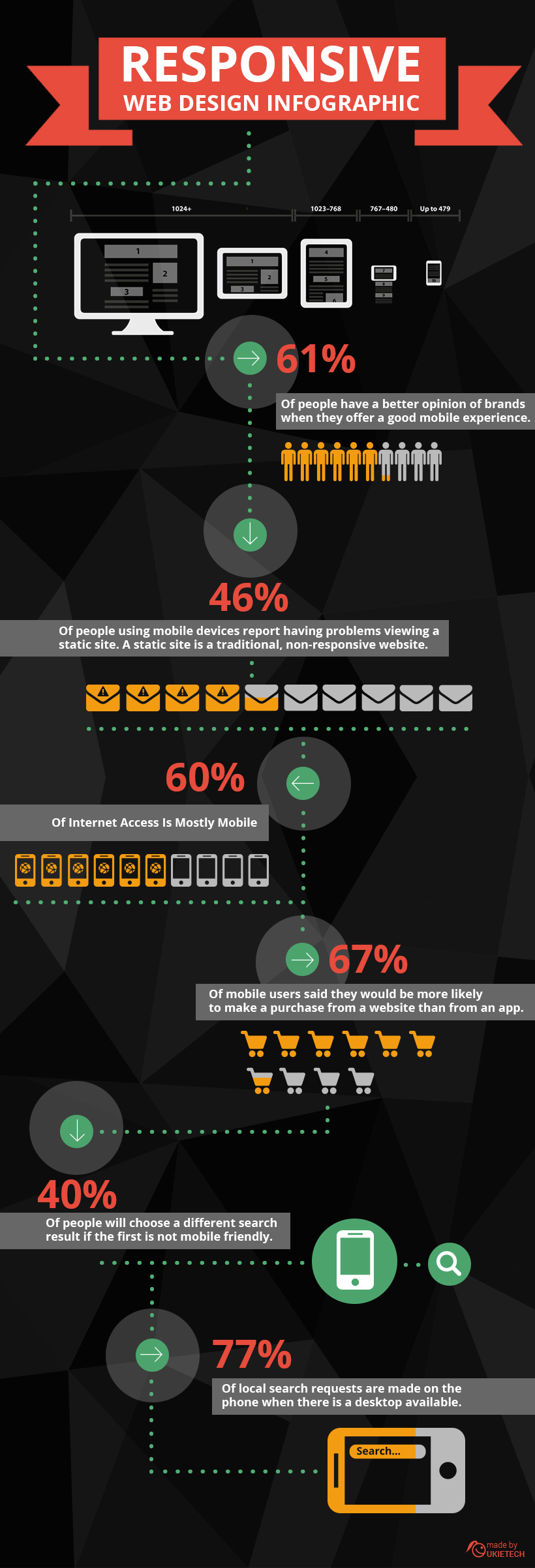We have been hearing a lot about mobile-friendly websites and apps lately. Is it really that important and do you need any of these at all? To make it easier to understand, I will explain this in simple terms giving pure facts and a little statistics.
By the end of 2016, 58% of all American adults will regularly use internet via smartphones, according to eMarketer research. It has become common to use our phones to search for anything on the web and it’s natural because it’s convenient. You use internet while waiting for an appointment, traveling in public transport or just lying on the couch and being too lazy to get up and use a desktop. Today 94% of smartphone owners in USA search for local information using their smartphones and 77% of these search requests are made on the phone when there is a desktop available.
All of the above means that our online presence should be optimized for mobile phones if we want our website visitors to come to our website when they are using their smartphones. If your business brings you any customers through the internet, mobile-friendliness is just critical for your income growth and conversions.
Now the question is as follows: Should I have a mobile application or responsive website to make my customers visit my website more often and make them willing to buy goods online?
1.Mobile application. Users can download it, install and use on their smartphones like any other software they have on their phones. Apps are designed for a unique user experience according to the operating system of a device.
2.Responsive web design (RWD). In simple words, it is a standard website that instructs a mobile phone or any other device on how to be displayed in the best possible way. Basically, it is just one website that can be accessed and well viewed from all devices with any operational system.
Now let’s figure out which of the above will best meet your needs and consider each factor separately.
Development
If you have neither an existing website, nor an app, it will take about the same time period to create one. If you already have an existing website, it will be much faster to make it responsive. Take into account that you will need approval from App Store or Play Market and extensive guidelines to follow if you choose to create a mobile app. On the contrary, launching a responsive website will spare you such inconveniences. Your mobile application will be built on the operating system you choose, most probably, iOS or Android and will be possible to use solely on that specific operating system. Responsive website instead is built using single code and is compatible with all operating systems.
Usability
Mobile applications often incorporate features of your phone, like GPS, camera etc. which is not typical of responsive websites. An app works faster than a website but, again, the speed and features are exclusive to the operating system the app is built on. RWD will be viewed perfectly well on any device with any screen resolution while a mobile app is not suitable for desktops and devices with irregular screen sizes. Yet, a responsive website needs to be optimized for the resolutions you choose.
Maintenance
Imagine you have a standard website and then you decide to have an app developed. Now, if you have any considerable changes you want your visitors to be aware of, you have to make corrections on your website and an app. Quite possibly you will have to contact your app and website developers to help you with that so it’s doing twice the work. Anything you have to add, change or remove - needs to be done twice. Having a responsive website, you can do all changes in one place, which means lower maintenance costs and less effort. This will also refer to future updates for new browser and OS versions you will have to make for an app, where RWD will most probably be compatible with any new versions.
SEO
First of all, note that a single website version improves your page rank. If you consider visibility in search engines an important factor in your business strategy, responsive website is necessary to increase your website traffic. A mobile app is not indexed by Google or other search engines since it does not live on the web. This means you will have to increase traffic to your app using other methods, like link-building, which is also more productive to do for one website.
Take into consideration the fact that content which is placed on a single website is much easier for users to interact with and share.
Google recommendations
Having 67% search market share, Google recommendations are worth following. Google recommends responsive web design as the industry best practice. Starting April 21, mobile-friendly websites will be featured more prominently on mobile search results, as stated by Google. Mobile-friendliness is becoming a crucial factor in user experience and so affects search results which soon will have even more influence.
Cost
This is quite a disputable point as the rates are different and the quality too. Normally, development of a mobile app is more expensive requiring a wide functionality range. Furthermore, a responsive website is much more cost-effective if you consider maintenance costs for the future.
To summarize the points above, most of them prove that mobile web presence is important indeed and a responsive web design is a better solution in terms of development, cost, maintenance and SEO.
Developing a responsive website with Ukietech you don’t need to worry
about cost. Our team develops fully responsive websites offering
individual payment plans for a year or two. So, you can start using your
responsive website before you pay for it. Hurry up and get mobile-friendly.

